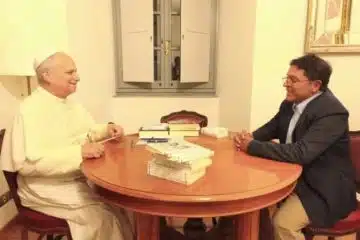The Catholic Moment: Offer it up!
July 14, 2011
By Jeanne Hunt
It’s summer and it’s too darn hot. The only happy people are the tomato warriors who are delighted with God’s little joke because juicy, red Big Boys are in the making.
But, perhaps I should keep my comments to myself. From an early age, Catholics are taught that whining about discomfort, inconvenience, pain and suffering is out of the question. Like the saints before us, we are to “offer it up.” The voices of Sister Mary Philomena, Father O’Malley and Grandma Reimenschneider ring in our ears, “Just offer it up for the poor souls in purgatory!” We are to live lives of selfless devotion and quit the griping.
The classic Catholic philosophy is that it is not all about me. This way of thinking is not so popular in this narcissistic world. Almost everyone under the age of 65 fervently believes that it is all about the sacred “me.” We want comfort, happiness, convenience and wealth regardless of how our needs impact the rest of humanity. I don’t think Jesus is very happy about this point of view. He told us to lay down our lives for another, embrace our cross and suffer greater things just as He did for His sake and for the kingdom. Oh pooh! Just when we were thinking it is heaven all the way to heaven, He asks us to bear up under the weight of the cross (which right now seems to be to baking in the sun like a bunch of hot-cross buns).
This “offer it up” spirituality is not for beginners. The freshman in the pews might want to start out slow: Keep your mouth shut in rush-hour traffic, eat your sister-in-law’s potato salad with a smile and wear earplugs while your husband snores away. Yet, once we get the hang of it, it’s deliciously deceiving. People begin to notice that we’re not so superficial. We’re even pleasant to be around. And, even more amazing, we seem to feel better about life in general.
The idea of getting the focus off my sore toe and on the beautiful sunrise or the needs of an infant in our arms is sweet balm for the soul. This is a grace and a holy accident. I believe that the original intention of “offer it up” was quite different. It seems there are several opinions as to why Catholics were raised to believe in offering it up:
• First, many in days gone by believed that there was a time clock in purgatory. Our time of purgation was calculated in days and years. We get three days in purgatory for throwing a tomato at our baby sister, three years for cheating on the Calculus final, 30 years for driving drunk and 300 for stealing the Sunday collection. You get the idea. When we offered up our headache for that scoundrel, Uncle Fred, who was doing time in purgatory, we could erase some of his sentence. What a plan!
• Then, there was the belief that we could join our suffering with the suffering of Jesus on the cross. When we offer up our pain to Christ, when we enter into a union with Christ crucified, we become like Him. If it is good enough for Jesus, it is good enough for us. St. Paul encourages us to unite ourselves with Christ in this way. In a mystical way, we become one with Christ on the cross. Lots of saints signed up for this plan: St. Francis of Assisi, St. Thérèse of Lisieux and St. Rose of Lima, to name a few.
• The last option is all about love. Offering up is like giving a bouquet of roses to the Divine One. Such practices as fasting, abstinence and silently tolerating Aunt Dorothy’s non-stop talking on a six-hour road trip are all ways to give God a sign of our love. Much like two lovers who give each other wordless tokens of devotion, “offering it up” is an opportunity to live the love we profess.
“Offering it up” has long been a mystery. Every Catholic kid heard it and had absolutely no idea what it meant. Now we have three options from which to choose. Personally, it’s the third option for me. I am hopelessly in love with that Jesus, so this heat suits me just fine.
Hunt is the catechetical and evangelization advisor for St. Anthony Messenger Press/Franciscan Communications.













